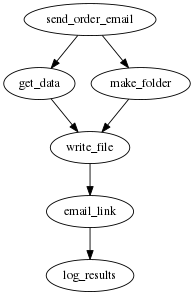async-auto-funcs: Helper functions and one wrapper for the awesome async.auto.
Caolan's async.auto is awesome!
When you think about asynchronous code you realise that the code you're writing is full of little sub tasks and those sub tasks sometimes have some dependencies on other little sub tasks. Eventually you will come to the conclusion that your code could, and perhaps should be, represented similar to a graph.

When I think about code like this I often see things that either do not happen in parallel which should, or parameters come into a function for the sole purpose of being passed out of the function.
I recently discovered async.auto. If you've not seen this you should look at it. This amazing library enables the writing of code as a series of functions that have named dependencies on other functions, which in effect makes representing graphs like above in code possible. It can have trasformational effect on your code quality.
If async.auto is so amazing, what is the purpose of the code here?
Looking through the docs for async.auto I was immediately struck by the power and awesomeness of it but there were tiny details I disliked...
The parameters are ugly.
The first thing that struck me was that it forced my task functions to take an object parameter with many async results in it. The official example looks a bit like this:
asyncThis is all well and good and also, absolutely amazing but considering the function signature of email_link which is function(results, callback) something strange starts to reveal itself. The results paramater will have something like { get_data: 'YourDataHere', make_folder: 'folder', write_file: 'filename' } stored within it, this has some downsides:
- The
email_linkfunction is not re-usable as it's signature is polluted by it's calling code. It would be much better to have a signature such asfunction(filename, callback). - If the function
email_linkis stored in another file, perhaps very isolated from the theasync.autocall itself later on someone may want to attach the file instead of linking and therefore you only the data stored inresults.get_data. In the isolation of theemail_linkfunction this is good because we would not have to read the file to get data we already have but the consequence on the system is that it would make it libel to being broken by changes elsewhere in the system. - Related to the previous point, in computer science terms we have unintentionally increased the coupling of the
email_linkfunction to the rest of the system.
I understand all the computer science stuff, but is there anything else?
I sometimes want to be able to write and use functions that returned promises instead of using callbacks so I integrated that too.
How does this code help?
This repository contains a few functions to compliment async.auto to smooth out the things I highlighted above.
makeAsyncAutoTaskSpec / makeAsyncAutoTaskSpecP
The function makeAsyncAutoTaskSpec and it's Promise powered variant makeAsyncAutoTaskSpecP wrap the task functions in async.auto for the purpose of working with normal parameters.
You can now write:
var makeAsyncAutoTaskSpec = makeAsyncAutoTaskSpec; { var fs = filename = folder + '/filename.txt'; fs;} asyncor:
var makeAsyncAutoTaskSpecP = makeAsyncAutoTaskSpecP; { var fsp = filename = folder + '/filename'txt; return fsp ;} asyncmakeAsyncAutoHandlerFunc
This is similar to makeAsyncAutoTaskSpec but is for the callback at the end of async.auto. It works like to this:
var makeAsyncAutoHandlerFunc = makeAsyncAutoHandlerFunc; asyncasyncAutoPromise
If you are:
- writing Promise based code in general.
- Your
async.autotasks use themakeAsyncAutoTaskSpecPwhich are Promise based too.
Then you find it a bit inconsistent that async.auto uses a final callback, which kind of breaks your happy Promise based world.
The existance of asyncAutoPromise converts async.auto into a Promise returning function so it can be used like the following:
var asyncAutoPromise = asyncAutoPromise; ;But it can also be used like the following:
var asyncAutoPromise = asyncAutoPromise; ;So it is just a pretty simple wrapper really but to me it feels like it has to be there to complete the job.
